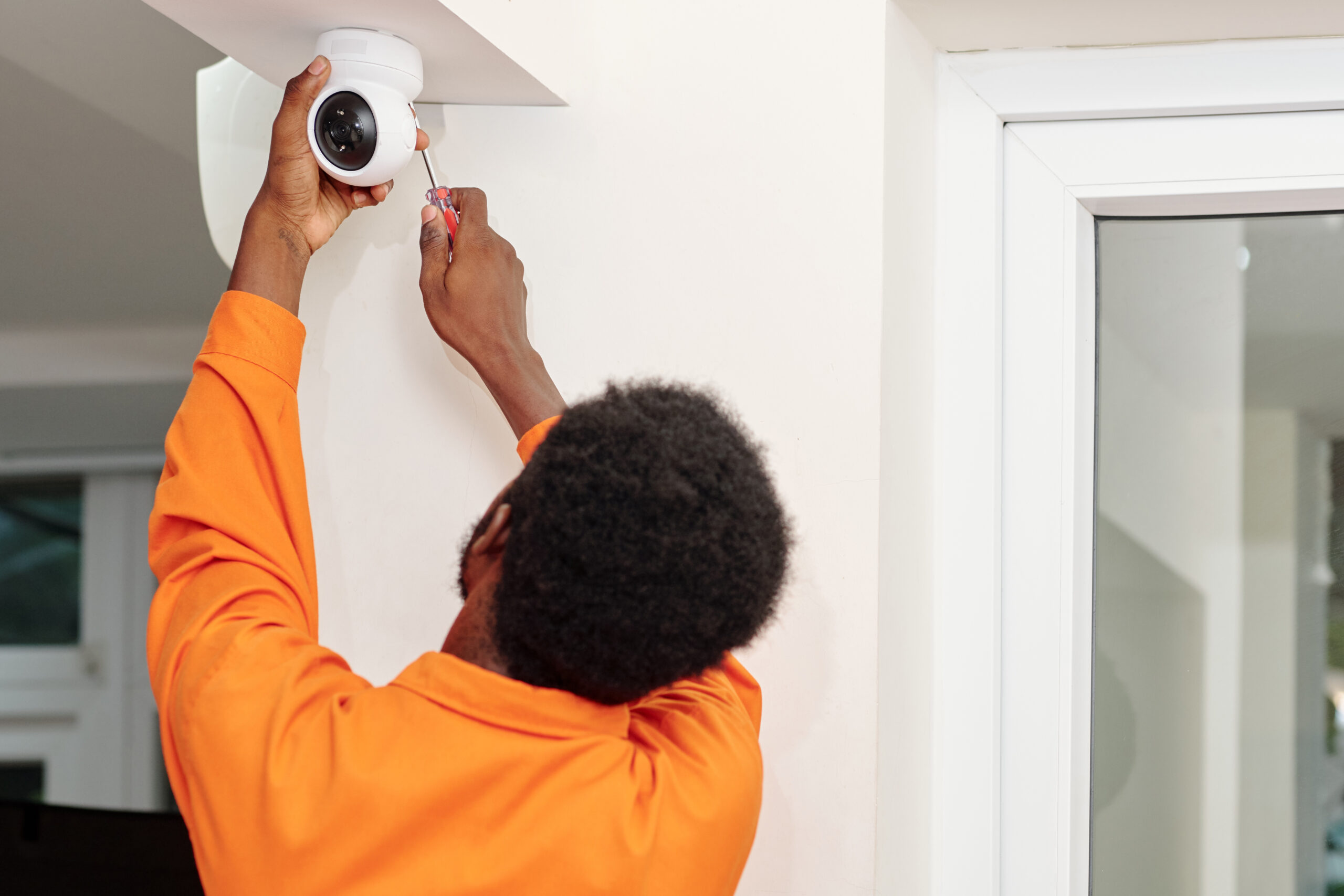Free Security System: Total Protection, No Fees

Did you know that most homeowners—75%—don’t have a security system? This is surprising, especially since homes without security features are three times more likely to be targeted by burglars [1].
Fortunately, modern free security systems make it easy to protect a home without high costs. These options offer self-monitoring and affordable equipment, helping homeowners feel secure without monthly fees. This article covers the essential features, popular choices, and important factors to think about when picking a free security system. Keep reading to discover how to safeguard a home without overspending!
Key Takeaway
- Many free security systems provide self-monitoring options, so users can oversee their security without ongoing expenses.
- No long-term contracts allow users to purchase equipment outright, avoiding future complications.
- While these free systems are budget-friendly, they may come with limited features and emergency response capabilities.
Key Features of Free Security Systems
Free security systems come with features that many homeowners find really helpful. One big advantage is self-monitoring.
SimpliSafe
Systems like SimpliSafe allow users to keep an eye on their homes whenever they want, which means they don’t have to pay for monthly monitoring services. Users can arm and disarm their systems at any time and even watch live video feeds directly from their phone apps. This level of control gives them peace of mind knowing they can check on their property whenever needed.
Another great feature is the absence of long-term contracts. Many security systems require users to sign lengthy agreements, but with free systems, homeowners can buy their equipment outright. This means they don’t need to worry about being tied down to a contract. It gives homeowners more control over their security choices, allowing them to change or upgrade their systems as they see fit.
Eufy
Affordable equipment packages are also a big draw for users. Brands like Eufy Security offer starter kits priced around $139.99. These kits typically include important parts like sensors and alarms, making it easy for anyone to start their security setup without spending a lot of money right away. This affordability opens security options for more people, allowing them to protect their homes without breaking the bank.
Lastly, easy installation is a major advantage of these systems. Most free security systems are designed for DIY installation, which means homeowners can set everything up themselves. This saves both time and money, as there’s no need to hire a professional for installation.
Homeowners can follow simple instructions to get their systems up and running, making it an accessible choice for anyone eager to enhance their home’s security. Overall, these features make free security systems a practical option for many homeowners looking to keep their properties safe without overspending.
Popular Free Security System Options
Several free security systems have become popular among homeowners. One top choice is SimpliSafe. It is known for being flexible, allowing users to self-monitor without paying for a subscription. This makes it a great option for those who want to save money. SimpliSafe offers different equipment packages and even provides professional monitoring if needed.
Another solid option is Eufy Security. This system comes with door and window sensors, along with motion detectors, all without any monthly fees. Customers love how easy it is to set up and how well it works over time.
Abode is also worth mentioning. It offers a no-subscription plan for self-monitoring. While it might not have some advanced features, it connects well with many smart home devices, making it a good choice for homeowners wanting to use their security with other gadgets.
Lastly, Ring Alarm is a popular name in home security. Users can access basic features without ongoing costs. This flexibility makes it a good fit for those who wish to protect their homes without worrying about extra expenses.
Considerations When Choosing a Free Security System

When choosing a free security system, users should be aware of possible hidden costs. Some companies may call their systems “free,” but it’s important to check the details [2]. Many systems require long-term contracts that can lead to big expenses later on. Sometimes, high monthly fees can add up quickly and surprise users.
Another thing to think about is that some free systems have limited features. They might not offer advanced options like cloud storage for video recordings or professional monitoring services. Users will need to respond to alerts themselves, which means they could miss immediate help during emergencies.
Lastly, users should consider the limits of emergency response. Without professional monitoring, there can be delays when help is needed. Alerts go straight to the user instead of a monitoring center. This might slow down emergency assistance, which is something every homeowner should think about when picking a security system.
FAQ
How do smart locks and video storage work with DIY systems?
DIY systems let you watch live footage and store videos from your front door camera. Smart locks work with your mobile app, giving you control over who enters. Most systems include basic video storage, but some charge a monthly fee for extra space.
What makes abode systems and Google Nest good DIY friendly options?
Both are top picks for DIY friendly installation. The abode iota and abode cam offer great features through the abode app. Google Nest integrates smoothly with smart devices and gives you peace of mind with easy setup.
How do motion sensors and entry sensors help keep an eye on your home?
These sensors are crucial for home security. Motion sensors detect movement while entry sensors tell you when doors or windows open. Together with glass break detectors, they help keep an eye on your property day and night.
Can you view live footage and control your system through a mobile app?
Yes! Most systems let you view video and control your alarm panel through their mobile app. You can check live footage, adjust smart devices, and get alerts anywhere with LTE cellular backup.
What should I know about base stations and control panels?
The base station acts as your system’s brain, while the control panel lets you manage everything. Many include panic buttons and connect to Z wave devices for home automation. Most are UL certified for safety.
Do security kits include smoke alarms and water leak detectors?
Many smart alarm systems and security kits include environmental sensors. These detect smoke alarms and water leaks, adding extra protection. Some systems like Blue by ADT and Vivint Smart Home offer these as add-ons.
How does night vision work with outdoor cameras?
Best outdoor cameras like the Arlo Pro 2nd gen offer high quality night vision. This lets you view video clearly in darkness, helping you monitor your garage door and yard 24/7.
What’s included with a system’s upfront cost versus monthly fee?
Plans start with basic equipment at the sale price. While some offer free security monitoring, others charge a monthly fee for advanced features. Many companies provide a free quote to help you understand total costs.
Can these systems work with Apple HomeKit and other smart devices?
Many modern alarm systems connect with Apple HomeKit and other smart home platforms. This lets you add video doorbells, door locks, and other smart devices for best smart home integration.
How do I get started today with my new security system?
Most companies make it easy to start – just pick a security kit that fits your needs. They’ll do a great job walking you through setup. Abode offers helpful guides, and systems like Blue by ADT provide step-by-step instructions.
What features do you get from key fob and alarm panel access?
Key fob access gives you quick control without using your phone. Most alarm panels also work with these handy devices, making it simple to arm or disarm your system with one click.
How do best video doorbell cameras help secure the front door?
Video doorbells help monitor package deliveries and visitors. Look for ones with high quality resolution so you can keep an eye on your front door clearly, both day and night.
Is the base station’s LTE cellular backup important?
Yes! LTE cellular backup keeps your system working even if WiFi fails. This means your base station stays connected to monitoring services, giving you real peace of mind during internet outages.
What kinds of free security features come standard?
Many systems offer basic features without a monthly fee. These fee security options often include app access, sensors, and limited video storage to get you started.
How do control panel and smart devices work together?
Your control panel manages all your smart devices from one place. Whether it’s adjusting door locks or checking cameras, the system works smoothly to connect everything.
The Bottom Line
Many free security systems provide effective protection without monthly fees. Users benefit from self-monitoring, no long-term contracts, and affordable equipment. However, it’s important to watch out for hidden costs and limited features. By carefully checking their options, homeowners can choose the right free security system that fits their needs. This way, they can keep their homes safe and secure without overspending.
References
- https://www.technavio.com/report/home-security-system-market-industry-analysis
- https://securitycentralinc.com/2018/01/26/is-a-free-security-system-really-free/